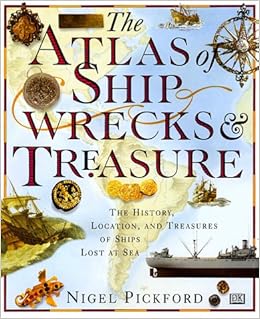A KEY WORD SEARCH THAT WE ARE SEEING A LOT OF THAT DOESN'T QUITE FIT ANY OF OUR SPECIAL INTERESTS PAGES ARE VARIOUS VERSIONS OF EITHER SPECIFIC SHIP WRECK LOCATIONS OR HOW TO RESEARCH SHIP WRECK LOCATIONS
 HERE IS A GREAT PLACE TO START SUCH RESEARCH Click on the title below to read more about or order this book:
HERE IS A GREAT PLACE TO START SUCH RESEARCH Click on the title below to read more about or order this book: The Atlas of Shipwrecks & Treasure: The History, Location, and Treasures of Ships Lost at Sea
"The first comprehensive illustrated guide to ships lost at sea and the treasures they have yielded, capturing the romance and the risks of treasure hunting. Find the story of the 40 most significant wrecks, hand-drawn maps of sea-routes, and spectacular color photographs of boats, salvage techniques and recovered treasure."
- ISBN-10: 1564585999
- ISBN-13: 978-1564585998 These ISBN numbers may help your librarian find a copy for you
SOME RELATED PUBLICATIONS INCLUDE:
Click on any of the book icons above to read more bout these books, check latest prices, find ISBN numbers or purchase on line.
Keep in mind that there are many legal aspects that have to be considered before diving on or otherwise interacting with a shipwreck. Under both international law and the law of most coastal states war wrecks are usually considered grave sites and are completely protected. Ship wrecks are not generally considered owner less but remain the property of the ship owner, or the owners heirs or assigns, or in the case of state vessels the government of the flag state. Below are some informative links starting with a general description of the subject of shipwrecks.
SHIPWRECKS

(PD-old-100)
ABANDONED SHIPWRECK ACT: The U.S. law on wrecks in waters under the jurisdiction of the United States
WRECK AND SALVAGE LAW IN THE UNITED KINGDOM
THE INTERNATIONAL LAW OF THE SEA AND MRINE ARCHAEOLOGY
HOW DO YOU FIND A SHIPWRECK? An introduction to the subject. There is very little here about the real first step which is usually a lot of library research.
SHIPWRECK RESEARCH: A more complete description of the process including the logical first step research.
No comments:
Post a Comment